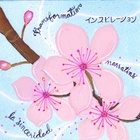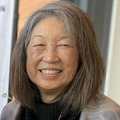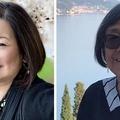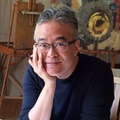For this month’s column, opening us into a whole new year, I’m so happy to feature healer and artist kyoko nakamaru and filmmaker Tani Ikeda, who together are co-founders of JAWS — Japanese American Women Speak. They are both based in Los Angeles, California (Kyoko via Wisconsin and Iowa, and Tani via Seattle). Both selections here are impassioned pieces by two fierce Nikkei who call on us to listen, respond and heal with the world around us.
—traci kato-kiriyama
* * * * *
Kyoko Nakamaru is an interdisciplinary artist, storyteller, writer, spiritual counselor, and hobby musician who uses her relationship with ancestors and the unseen to weave stories of what was and what will be.
A Yonsei, raised in Wisconsin and Iowa by devoted local and global activists, Kyoko considers herself a part of the internment diaspora, those whose families were permanently displaced from the west coast after WWII. She continues to carry her family’s commitment to environmentalism, social justice, and human rights and seeks to use all the mediums she works in as medicine to help her communities heal. Kyoko is one of the co-founders of Japanese American Women Speak, a network of Nikkei feminist artists dedicated to social change.
aishimasu wataru.
before language
the shape of you was
an unexplored legacy
of assimilation and shame
heavy and red
a warning from my father.
i heard your spirit
before i heard his pain
the crisp cut of a backhand
the laundry folded wrong
too much eye-contact
not enough humility.
punished by someone-will-see-you panoptic fear
incarceration residue
stains on my service whites that won’t wash out.
i am afraid
deep within
for what they have done to you.
i have never mailed in a completed census.
i know what is coming when i say so.
that is illegal, my father replies.
but what do you think about the citizenship question, i ask repeatedly.
his answers are a hornet’s nest
my words are the stick.
he will not look at me
until i anger him
my grandfather is in my father’s eyes
in the bite of my voice.
what legacy is this?
what inheritance of war,
this small animal caged within
that lashes out
when cornered?
here you are again,
the shape of your wounds wound tight within us,
uncoiling
recoiling
here i am whispering,
aishimasu wataru.
aishimasu wataru.
whatever will we make of forgiveness?
* This poem is copyrighted by Kyoko Nakamaru (2019)
* * * * *
Tani Ikeda is an Emmy winning director who creates narratives, documentaries, music videos, and commercial films. She was recently selected as one of Sundance’s 2018 intensive screenwriting lab’s fellows and was also named one of Film Independent’s 33 Emerging Filmmakers as a Project: Involve Directors Fellow. Ikeda was an Executive Producer and Director on the Blackpills Documentary TV Series “Resist” with Black Lives Matter co-founder Patrisse Cullors about the fight against LA County's 3.5 billion dollar jail plan. Ikeda has directed films in China, Uganda, India, and the United States. Her work has been recognized in The Hollywood Reporter Teen Vogue, Cosmopolitan magazine and has screened internationally at festivals around the world including the Sundance Film Festival.
At the age of 21, Tani Ikeda co-founded imMEDIAte Justice, a nonprofit that fosters the talents of young women artists working in virtual reality. She is the current executive director of imMEDIAte Justice and was named one of the “25 Visionaries Who are Changing Your World,” by the Utne Reader. ImMEDIAte Justice has received national attention on CNN, NBC, and Univision. Ikeda tours the country speaking at universities and national conferences about storytelling as a tool for social justice.
the nail that sticks out
I remember my grandfather,
who was a long-haired, radical, artist,
telling me when I was a girl,
“The nail that sticks out gets hammered.”
At that time
I was getting laughed at in the classroom for struggling to read
and teased on the bus ride home
for eating seaweed rice balls
and being a “Jap.”
I wanted to get so small I would disappear.
But my grandfather saw me.
He told me that everything I was experiencing
made me an artist.
He said I was born an artist.
I would never be
like everyone else.
Being brown and dyslexic didn’t make me weak.
It allowed me to see the world
unlike anyone else.
As a little girl,
I remember Grandpa telling me stories
about being in McNeil Penitentiary for draft evasion
—how when prison riots raged,
inmates lit their mattresses on fire
and threw them between the bars.
Grandpa remembers banging his metal cup
against the cage.
“This was our way of crying,”
he said.
He would pound the kitchen table
until it shook
as if to beat down the metal cage
of memories.
His lips twisted,
his eyes softened,
and tears peeled down his cheeks.
I memorized every expression—
every story he’d tell me.
At the end, Grandpa would shake his head and say,
“The nail that sticks out gets hammered.”
Although Grandpa had tuberculosis and
could have avoided the draft
by naturally failing the army physical,
he believed refusing to enlist
was his way
of taking a stand
against a country that imprisoned
him, his family and his community.
Now, when I think of my grandfather
looking down on his small, tender grandchild,
I know that he was afraid—
afraid that what this country had done to him
is what it could do to me.
Now I know he spent years and years
telling me stories about his life
so I would be ready
for the challenges
I faced in mine.
This past year,
I have been documenting organizers on the frontlines
of the resistance against white supremacy.
I have been filming with the cofounders of Black Lives Matter.
I filmed the co-organizers of the Women’s March on Washington
and documented them as they marched 18 miles from the NRA headquarters
to the Department of Justice
while hordes of white men
armed with assault rifles
intimidated and taunted them.
We were in Charlottesville
as Neo Nazis
beat Black and brown youth,
We witnessed children torn apart
from their undocumented mothers
by ICE,
We filmed as hundreds of protesters at LAX chanted,
“We welcome you!”
to those who were separated from their loved ones
after the Muslim Ban:
Executive Order 13769.
And what I see is this:
America is at war with itself.
Instead of defending democracy
from German Nazis,
Fascism has taken on the symbolism
of our own national anthem
and Star Spangled Banner,
and anyone who dares
take a knee
against racism
is deemed an enemy
of this country.
Now, as before,
our country is looking for an enemy within.
75 years ago,
Japanese Americans lived through a war
that rounded up our American families
and put us in concentration camps.
We were told we were not American.
And this cycle of systemic injustice
continues
If you are Black, undocumented,
queer, Muslim,
you are being vilified, hunted, and killed with impunity.
Today’s gray, Seattle weather
is like a day I would visit my grandfather.
Today I want nothing more
than to sit at the kitchen table
and ask him what I should do
in these times of fear and political terror.
Yet, all I have left are his stories.
I’ve been raised in a tradition of struggle
and the art of seeing what
does not yet exist.
As a filmmaker,
every day I am in the crossfire
of stories that echo
the injustices of the past.
Linda Sarsour co-organizer of the Women’s March on Washington walks on the opposite side of the street from her son for fear of being shot as a terrorist.
11-year-old Leah fights for her mom with other children separated at the border as they chant “We Belong Together”
Patrisse Cullors co-founder of Black Lives Matter chanted Charleena Lyles’ name.
She was a mother from Seattle shot in front of her babies by police.
“They win when we stop feeling,” Patrisse says.
Many times I wake up shaking with anxiety.
But it is this pressing urgency,
that gets me out of bed.
Telling our stories will keep us alive.
They will open the heart
of this country
by breaking it.
* This poem is copyrighted by Tani Ikeda (2019)
© 2019 Tani Ikeda; Kyoko Nakamaru











